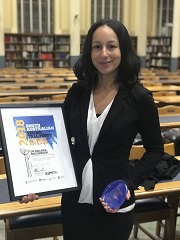31 July 2018
 A University of South Australia researcher who works with materials a billion times smaller than a metre has taken out a Young Tall Poppy Science award for her ground-breaking work in nano-architecture.
A University of South Australia researcher who works with materials a billion times smaller than a metre has taken out a Young Tall Poppy Science award for her ground-breaking work in nano-architecture.
Dr Melanie MacGregor, a Santos-UCL Research Fellow at UniSA’s Future Industries Institute, was last night named one of 10 Tall Poppy Scientists for South Australia in 2018.
The 33-year-old is building a solid track record in nanoengineered biomaterials, developing devices using plasma coatings to capture cancer cells from urine samples, growing stem cells and improving oil and gas recovery for the mining sector.
Her research involves designing surfaces at a minute scale to influence how they interact with their environment – a field billed as “the next industrial revolution”.
Dr MacGregor’s key focus involves working with a team of 12 scientists to develop a commercial non-invasive microfluidic device to detect bladder cancer cells in urine. The team is hoping to start clinical trials this year using this new, pain-free technique.
In the five years since completing her PhD at UniSA, Dr MacGregor has published 30 high-impact, peer-reviewed articles and won a number of awards, including the Ian Wark Medal, the John A. Brodie Medal for Chemical Engineering, the Winnovation Engineering Award and the UniSA ITEE ECR Award.
She is a keen supporter and volunteer of Science Alive, the largest single interactive science exhibition in Australia, and actively promotes women in STEM.
Dr MacGregor will be considered for the overall Young Tall Poppy of the Year Award, to be announced as part of the SA Science Excellence Awards ceremony in Adelaide on Friday 10 August.
An example of Dr MacGregor's work can be found at: https://www.youtube.com/watch?v=hAVTpzPJSwY
Media contact: Candy Gibson mobile 0434 605 142 email mailto:candy.gibson@unisa.edu.au



